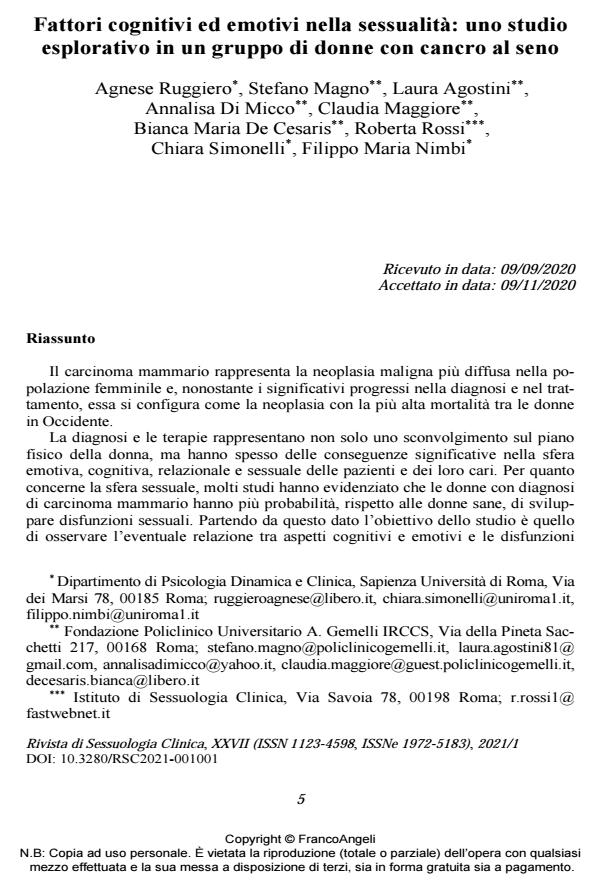Cognitive and emotional factors in sexuality of women with breast cancer: an ex-ploratory study
Journal title RIVISTA DI SESSUOLOGIA CLINICA
Author/s Agnese Ruggiero, Stefano Magno, Laura Agostini, Annalisa Di Micco, Claudia Maggiore, Bianca Maria De Cesaris, Roberta Rossi, Chiara Simonelli, Filippo Maria Nimbi
Publishing Year 2021 Issue 2021/1
Language Italian Pages 18 P. 5-22 File size 221 KB
DOI 10.3280/RSC2021-001001
DOI is like a bar code for intellectual property: to have more infomation
click here
Below, you can see the article first page
If you want to buy this article in PDF format, you can do it, following the instructions to buy download credits

FrancoAngeli is member of Publishers International Linking Association, Inc (PILA), a not-for-profit association which run the CrossRef service enabling links to and from online scholarly content.
Breast cancer represents the most common malignant cancer in the female population and it is the cancer with the highest mortality in the world’s female population. It has been shown in the literature that women with breast cancer are more likely to develop sexual dysfunction than healthy women; women with breast cancer often develop difficulties in their body image and feminility, because cancer affects a secondary sex organ. The aim of current study was to explore the relationship between sexual dysfunction and cognitive or emotional factors in women with breast cancer, in particular we investigated the construct of alexi-thymia, cognitive schemas, automatic thoughts and sexual dysfunctional beliefs. The study was conducted on 156 women, divided in two groups: 60 women with breast cancer and 96 healthy women. The women of the clinical group have been recruited in the departments of senological oncology and integrated therapies of the Policlinico Agostino Gemelli in Rome and the women of the control group were randomly extrapolated from the database of the Clinical Sexology Institute (ISC) of Rome. All women completed 4 self-report questionnaire: Questionnaire of Cog-nitive Schema Activation in Sexual Context (QCSASC), Sexual Dysfunctional Be-liefs Questionnaire (SBDQ), Sexual Modes Questionnaire (SMQ) to explore cogni-tive factors and Toronto Alexithymia Scale (TAS-20) to assess emoctional as-pects. MANCOVA statistical analysis was used to highlight statistically significant differences between the two groups; the covariates included were age, level of ed-ucation and relational situation. Also it was used the Chi2 test for frequencies. Analysis of the data shows that women with breast cancer have higher levels of alexithymia and more dysfunc-tional beliefs in the sexual sphere than healthy women. Regarding to sexual be-liefs, women in the clinical group perceive feelings as very important during sexual activity and consider the advancement of the chronological age a negative ele-ment for the sexual sphere. Previous research shows that also women with sexual dysfunction believe that aging negatively affects sexuality; therefore this beliefs seems to be common to women with breast cancer and women with sexual dys-function. In women with breast cancer, this dysfunctional belief could be empha-sized by the iatrogenic induction of menopause. Regarding to alexithymia, women with breast cancer show higher scores in the subscale "difficult to identifying feeling" and "externally-oriented thinking". These results are partly in line with current literature, infact some studies have shown that women with breast cancer have more difficult to identify their feelings than healthy women, while according to other research there aren’t significant differ-ences in the alexithymia construct between women with breast cancer and healthy women. Finally in the questionnaires assessing automatic thoughts and cognitive schema there aren’t significant differences between clinical and control group. Fu-ture research could contribute to a better understanding of the role of cognitive and emotional aspects on the sexuality in women with breast cancer; prevention and treatment of sexual dysfunction and quality of life of women with breast cancer could be improved. The study has some limitation such as lack of previous scientific studies; this gap partially compromises the quality of the discussion of data emerged by the study and urges us to conduct further research, since this information could im-prove quality of life and health sex of women with cancer. Also the length of the protocol represents a limitation of the study, as it may have altered the reliability of the results; furthermore the research protocol is based exclusively on self-report questionnaires. Finally, there are significant differences related to age, educational level and relationship situation between two groups; however, to limit this problem, these variables have been included as covariates in MANCOVA statistical analysis.
Keywords: cancer, sexuality, emotion, cognitive schema, sexual beliefs.
Agnese Ruggiero, Stefano Magno, Laura Agostini, Annalisa Di Micco, Claudia Maggiore, Bianca Maria De Cesaris, Roberta Rossi, Chiara Simonelli, Filippo Maria Nimbi, Fattori cognitivi ed emotivi nella sessualità: uno studio esplorativo in un gruppo di donne con cancro al seno in "RIVISTA DI SESSUOLOGIA CLINICA" 1/2021, pp 5-22, DOI: 10.3280/RSC2021-001001